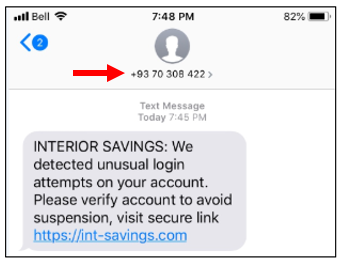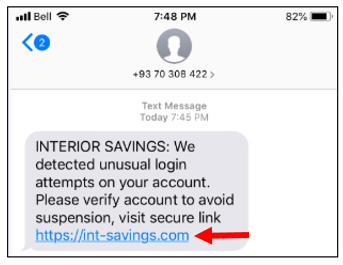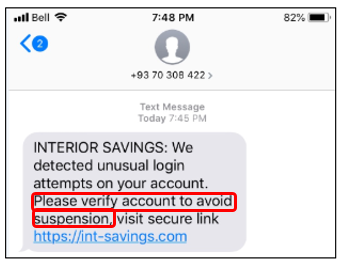Scammers are always looking for new ways to trick people into providing personal information. A common tactic that fraudsters are now using is sending fake text messages posing as a company you trust, in an attempt to get you to disclose personal or login information. The good news is that there are some telltale signs that a text is fraudulent. Read on to learn more.
Step 1: What number did the text came from?
Is it a foreign area code? If the “company” that is messaging you operates in BC, chances are they wouldn’t have a phone number from the other side of the world.

Step 2: What link are they asking you to click on?
Take a look at the link that the message is asking you to click on. Typically fraudsters will use an address that looks similar to a legitimate link in the hopes it will be close enough, and you’ll be distracted enough to click on it. Our website address is www.interiorsavings.com. Looking at the example below, you can see how someone might think this fraudulent link is real. Your best defense is to always double check a link before you click on it!

Step 3: Do the message instructions seem fishy?
Does the message have spelling or grammar mistakes? Is it threatening something like suspending or closing your account? Most companies, especially Interior Savings, would never ask you to confirm your identity or ask you to input confidential information (like your pin or account number) through a link.

When in doubt, trust your gut!
Some scammers are very tricky and circumvent all of the above warning signs. Consider whether you have ever received a text message from this company before. They probably wouldn’t start texting you without your consent or you initiating the exchange. If the message seems fishy when you read it… it probably is.
What to do if you receive one of these messages
Get in touch with the real company and tell them about the text. Businesses appreciate if you let them know that that someone is attempting to impersonate them. As long as you don’t click on the link, your account is safe. In most cases, the scammers don’t even know if you deal with the company they are impersonating. They simply blast their texts to a large number of people in the hopes that a few people take the bait.


